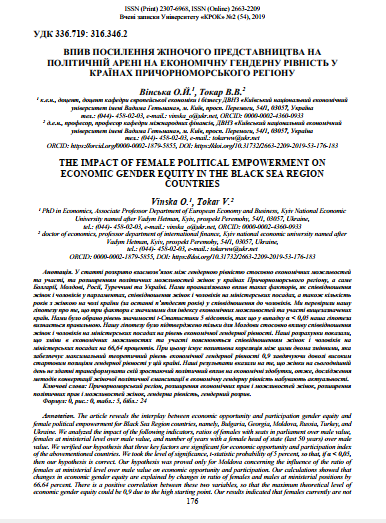THE IMPACT OF FEMALE POLITICAL EMPOWERMENT ON ECONOMIC GENDER EQUITY IN THE BLACK SEA REGION COUNTRIES
DOI:
https://doi.org/10.31732/2663-2209-2019-53-176-183Keywords:
Black Sea Region, female economic empowerment, female political empowerment gender equality, gender gapAbstract
The article reveals the interplay between economic opportunity and participation gender equity and female political empowerment for Black Sea Region countries, namely, Bulgaria, Georgia, Moldova, Russia, Turkey, and Ukraine. We analyzed the impact of the following indicators, ratios of females with seats in parliament over male value, females at ministerial level over male value, and number of years with a female head of state (last 50 years) over male value. We verified our hypothesis that three key factors are significant for economic opportunity and participation index of the abovementioned countries. We took the level of significance, t-statistic probability of 5 percent, so that, if α < 0,05, then our hypothesis is correct. Our hypothesis was proved only for Moldova concerning the influence of the ratio of females at ministerial level over male value on economic opportunity and participation. Our calculations showed that changes in economic gender equity are explained by changes in ratio of females and males at ministerial positions by 66.64 percent. There is a positive correlation between these two variables, so that the maximum theoretical level of economic gender equity could be 0,9 due to the high starting point. Our results indicated that females currently are not able to transform their growing political influence into economic gains, therefore, investigations of methods of converting female political emancipation into economic gender equity become topical.
Downloads
References
The Global Gender Gap Report 2009. URL: http://www3.weforum.org/docs/WEF_GenderGap_Report_2009.pdf.
The Global Gender Gap Report 2010. URL: https://www.weforum.org/reports/global-gender-gap-report-2010.
The Global Gender Gap Report 2011. URL: http://reports.weforum.org/global-gender-gap-2011.
The Global Gender Gap Report 2012. URL: http://www3.weforum.org/docs/WEF_GenderGap_Report_2012.pdf.
The Global Gender Gap Report 2013. URL: http://www3.weforum.org/docs/WEF_GenderGap_Report_2013.pdf.
The Global Gender Gap Report 2014. URL: http://www3.weforum.org/docs/GGGR14/GGGR_CompleteReport_2014.pdf.
The Global Gender Gap Report 2015. URL: https://www.weforum.org/reports/global-gender-gap-report-2015.
The Global Gender Gap Report 2016. URL: https://www.weforum.org/reports/the-global-gender-gap-report-2016.
The Global Gender Gap Report 2017. URL: https://www.weforum.org/reports/the-global-gender-gap-report-2017.
The Global Gender Gap Report 2018. URL: https://www.weforum.org/reports/the-global-gender-gap-report-2018.
Kelsey C. Gender inequality: empowering women. URL: http://aabri.com/manuscripts/131765.pdf.
Rice C. 6 steps to gender equality. URL: http://curt-rice.com/wp-content/uploads/2012/11/6-Steps-to-Gender-Equality1.pdf.
Stevens C. Are women the key to sustainable development? URL: http://bu.edu/pardee/files/2010/04/UNsdkp003fsingle.pdf.
Sustainable Development Goals. URL: https://sustainabledevelopment.un.org/?menu=1300.
Ward J., Lee B., Baptist S., Jackson H. Evidence for action: gender equality and economic growth. URL: https://chathamhouse.org/sites/files/chathamhouse/public/Research/Energy,%20Environment%20and%20Development/ 0910gender.pdf.
World Values Survey. URL: http://www.worldvaluessurvey.org/wvs.jsp.
Вінська О. Й., Токар В. В. Взаємозалежність гендерної рівності та інноваційної конкурентоспроможності країн ЄС. Глобальні та національні проблеми економіки. 2016. № 12. С. 18-22.
Вінська О. Й., Токар В. В. Гендерна рівність та соціально-економічний розвиток країн-членів Європейського Союзу. Східна Європа: економіка, бізнес та управління. 2016. №2. С. 32-36.
Вінська О. Й., Токар В. В. Політична емансипація жінок як фактор економічного розвитку країн ЄС. Науковий вісник Херсонського державного університету. 2016. Вип. 18. Ч. 1. С. 17-21.
Ворона М. Гендерні стереотипи: сутність, функції, наслідки. Статистика України. 2010. № 4. С. 71-74.
Закон України «Про забезпечення рівних прав та можливостей жінок і чоловіків». URL: https://zakon.rada.gov.ua/laws/show/2866-15.
Консолідовані версії Договору про Європейський Союз та Договору про функціонування Європейського Союзу. URL: https://zakon.rada.gov.ua/laws/show/994_b06.
Лосіхін О. Використання досвіду інституцій Європейського Союзу в удосконаленні нормативного забезпечення гендерної спрямованості державного управління. Вісник національної академії державного управління при Президентові України. 2012. № 3. С. 232–239.
Магдюк Л. Міжнародна технічна допомога для розвитку в Україні: підтримка програм забезпечення рівних прав і можливостей в Україні. Маркетинг в Україні. 2013. № 3. С. 10–17.


